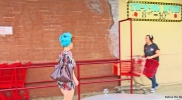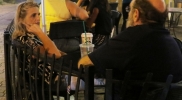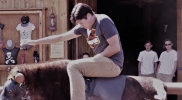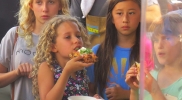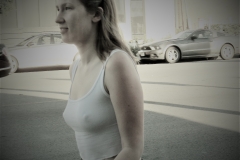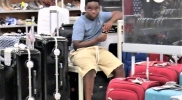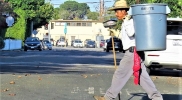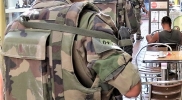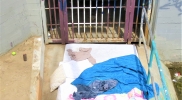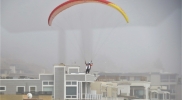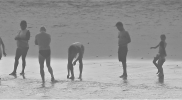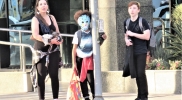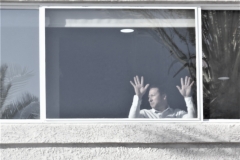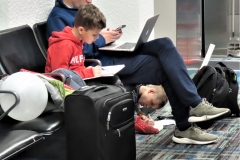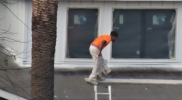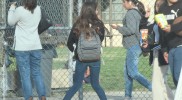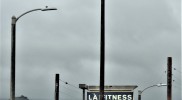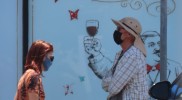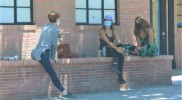|
|
Best Poems - Discrimination
|
Best Poems – DISCRIMINATION
|
| Boston Year – Elizabeth Alexander
“My first week in Cambridge a car full of white boys
tried to run me off the road, and spit through the window,
open to ask directions. I was always asking directions
and always driving: to an Armenian market
in Watertown to buy figs and string cheese, apricots,
dark spices and olives from barrels, tubes of paste
with unreadable Arabic labels. I ate
stuffed grape leaves and watched my lips swell in the mirror.
The floors of my apartment would never come clean.
Whenever I saw other colored people
in bookshops, or museums, or cafeterias, I’d gasp,
smile shyly, but they’d disappear before I spoke.
What would I have said to them? Come with me? Take
me home? Are you my mother? No. I sat alone
in countless Chinese restaurants eating almond
cookies, sipping tea with spoons and spoons of sugar.
Popcorn and coffee was dinner. When I fainted
from migraine in the grocery store, a Portuguese
man above me mouthed: ‘No breakfast.’ He gave me
orange juice and chocolate bars. The color red
sprang into relief singing Wagner’s Walküre.
Entire tribes gyrated and drummed in my head.
I learned the samba from a Brazilian man
so tiny, so festooned with glitter I was certain
that he slept inside a filigreed, Fabergé egg.
No one at the door: no salesmen, Mormons, meter
readers, exterminators, no Harriet Tubman,
no one. Red notes sounding in a grey trolley town.”
|
|
|
| Old Lem – Sterling A. Brown
“I talked to old Lem
and old Lem said:
‘They weigh the cotton
They store the corn
We only good enough
To work the rows;
They run the commissary
They keep the books
We gotta be grateful
For being cheated;
Whippersnapper clerks
Call us out of our name
We got to say mister
To spindling boys
They make our figgers
Turn somersets
We buck in the middle
Say, ‘Thankyuh, sah.’
They don’t come by ones
They don’t come by twos
But they come by tens.
They got the judges
They got the lawyers
They got the jury-rolls
They got the law
They don’t come by ones
They got the sheriffs
They got the deputies
They don’t come by twos
They got the shotguns
They got the rope
We git the justice
In the end
And they come by tens.
Their fists stay closed
Their eyes look straight
Our hands stay open
Our eyes must fall
They don’t come by ones
They got the manhood
They got the courage
They don’t come by twos
We got to slink around
Hangtailed hounds.
They burn us when we dogs
They burn us when we men
They come by tens. . .
I had a buddy
Six foot of man
Muscled up perfect
Game to the heart
They don’t come by ones
Outworked and outfought
Any man or two men
They don’t come by twos
He spoke out of turn
At the commissary
They gave him a day
To git out the county
He didn’t take it.
He said ‘Come and get me.’
They came and got him
And they came by tens.
He stayed in the county—
He lays there dead.
They don’t come by ones
They don’t come by twos
But they come by tens.”
|
|
|
| Sharecroppers – Sterling A. Brown
“When they rode up at first dark and called his name,
He came out like a man from his little shack
He saw his landlord, and he saw the sheriff,
And some well-armed riff-raff in the pack.
When they fired questions about the meeting,
He stood like a man gone deaf and dumb,
But when the leaders left their saddles,
He knew then that his time had come.
In the light of the lanterns the long cuts fell,
And his wife’s weak moans and the children’s wails
Mixed with the sobs he could not hold.
But he wouldn’t tell, he would not tell.
The Union was his friend, and he was Union,
And there was nothing a man could say.
So they trussed him up with stout ploughlines,
Hitched up a mule, dragged him far away
Into the dark woods that tell no tales,
Where he kept his secrets as well as they.
He would not give away the place,
Nor who they were, neither white nor black,
Nor tell what his brothers were about.
They lashed him, and they clubbed his head;
One time he parted his bloody lips
Out of great pain and greater pride,
One time, to laugh in his landlord’s face;
Then his landlord shot him in the side.
He toppled, and the blood gushed out.
But he didn’t mumble ever a word,
And cursing, they left him there for dead.
He lay waiting quiet, until he heard
The growls and the mutters dwindle away;
‘Didn’t tell a single thing,’ he said,
Then to the dark woods and the moon
He gave up one secret before he died:
‘We gonna clean out dis brushwood round here soon,
Plant de white-oak and de black-oak side by side.’” |
|
|
| I Told Susan Reyna – Sandra Cisneros
“I told Susan Reyna
I don’t like her
because she’s fat and ugly
and she wears big brassieres
and smells like chocolate candy
and comes in late each morning
with her tongue puff puffing
and her wrinkled blouse
half in half out
and who probably stole
Walter Milky’s money
and never gives back pencils
just sleeps all day
while we do numbers
or all the time in a red pen
she got for her birthday
writes Susan Susan Susan
in fancy letters
The nun says
we must be kind
to everyone
or rot in fires
including Susan
who is sick
and has the fits
till she gets tired
then two boys
have to hold her legs
down and one girl her dress
and she gets to sleep all day
and wakes with crumpled hair
and spit
This
is who I told
I don’t like you
because you stink
of chocolate
and menstruation
and who is sick
already 48 hours
but I don’t care” |
|
|
| Incident – Countee Cullen
(For Eric Walrond)
“Once riding in old Baltimore,
Heart-filled, head-filled with glee,
I saw a Baltimorean
Keep looking straight at me.
Now I was eight and very small,
And he was no whit bigger,
And so I smiled, but he poked out
His tongue, and called me, “Nigger.”
I saw the whole of Baltimore
From May until December;
Of all the things that happened there
That’s all that I remember.” |
|
|
Tableau – Countee Cullen
(For Donald Duff)
“Locked arm in arm they cross the way
The black boy and the white,
The golden splendor of the day
The sable pride of night.
From lowered blinds the dark folk stare,
And here the fair folk talk,
Indignant that these two should dare
In unison to walk.
Oblivious to look and word
They pass, and see no wonder
That lightning brilliant as a sword
Should blaze the path of thunder.” |
| We Wear The Mask – Paul Laurence Dunbar
“We wear the mask that grins and lies,
It hides our cheeks and shades our eyes—
This debt we pay to human guile;
With torn and bleeding hearts we smile,
And mouth with myriad subtleties.
Why should the world be over-wise,
In counting all our tears and sighs?
Nay, let them only see us, while
We wear the mask.
We smile, but, O great Christ, our cries
To thee from tortured souls arise.
We sing, but oh the clay is vile
Beneath our feet, and long the mile;
But let the world dream otherwise,
We wear the mask!”
|
| This’ll Hurt Me More – Camille T. Dungy
“Don’t make me send you outside to find a switch,
my grandmother used to say. It was years before
I had the nerve to ask her why switch was the word
her anger reached for when she needed me to act
a different way. Still, when I see some branches—
wispy ones, like willows, like lilacs, like the tan-yellow
forsythia before the brighter yellow buds—I think,
these would make perfect switches for a whipping.
America, there is not a place I can wander inside you
and not feel a little afraid. Did I ever tell you about that
time I was seven, buckled into the backseat of the Volvo,
before buckles were a thing America required.
My parents tried, despite everything, to keep us
safe. It’s funny. I remember the brown hills sloping
toward the valley. A soft brown welcome I looked for
other places but found only there and in my grandmother’s
skin. Yes, I have just compared my grandmother’s body
to my childhood’s hills, America. I loved them both,
and they taught me, each, things I needed to learn.
You have witnessed, America, how pleasant hillsides
can quickly catch fire. My grandmother could be like that.
But she protected me, too. There were strawberry fields,
wind guarded in that valley, tarped against the cold.
America, you are good at taking care of what you value.
Those silver-gray tarps made the fields look like a pond
I could skate on. As the policeman questioned my dad,
I concentrated on the view outside the back window.
America, have you ever noticed how well you stretch
the imagination? This was Southern California. I’d lived
there all my life and never even seen a frozen pond.
But there I was, in 70 degree weather, imagining
my skates carving figure eights on a strawberry field.
Of course my father fit the description. The imagination
can accommodate whoever might happen along.
America, if you’ve seen a hillside quickly catch fire
you have also seen a river freeze over, the surface
looking placid though you know the water deep down,
dark as my father, is pushing and pushing, still trying
to get ahead. We were driving home, my father said.
My wife and my daughters, we were just on our way
home. I know you want to know what happened next,
America. Did my dad make it safely home or not?
Outside this window, lilac blooms show up like a rash
decision the bush makes each spring. I haven’t lived
in Southern California for decades. A pond here
killed a child we all knew. For years after that accident,
as spring bloomed and ice thinned, my daughter
remembered the child from her preschool. And now,
it’s not so much that she’s forgotten. It’s more that
it seems she’s never known that child as anything other
than drowned. My grandmother didn’t have an answer.
A switch is what her mother called it and her grandmother
before her. She’d been gone from that part of America
for over half a century, but still that southern soil
sprang up along the contours of her tongue. America,
I’ll tell you this much, I cannot understand this mind,
where it reaches. Even when she was threatening
to beat me, I liked to imagine the swishing sound
a branch would make as it whipped toward my body
through the resisting air. She’d say, this is hurting me
more than it’s hurting you. I didn’t understand her then,
but now I think I do. America, go find me a switch.” |
| All Their Stanza Look Alike – Thomas Sayers Ellis
“All their fences
All their prisons
All their exercises
All their agendas
All their stanzas look alike
All their metaphors
All their bookstores
All their plantations
All their assassinations
All their stanzas look alike
All their rejection letters
All their letters to the editor
All their arts and letters
All their letters of recommendation
All their stanzas look alike
All their sexy coverage
All their literary journals
All their car commercials
All their bribe-spiked blurbs
All their stanzas look alike
All their favorite writers
All their writing programs
All their visiting writers
All their writers-in-residence
All their stanzas look alike
All their third worlds
All their world series
All their serial killers
All their killing fields
All their stanzas look alike
All their state grants
All their tenure tracks
All their artist colonies
All their core faculties
All their stanzas look alike
All their Selected Collecteds
All their Oxford Nortons
All their Academy Societies
All their Oprah Vendlers
All their stanzas look alike
All their haloed holocausts
All their coy hetero couplets
All their hollow haloed causes
All their tone-deaf tercets
All their stanzas look alike
All their tables of contents
All their Poet Laureates
All their Ku Klux classics
All their Supreme Court justices
Except one, except one
Exceptional one. Exceptional or not,
One is not enough.
All their stanzas look alike.
Even this, after publication,
Might look alike. Disproves
My stereo types.”
|
|
|
| Conversation with a Fireman from Brooklyn – Tess Gallagher
“He offers, between planes,
to buy me a drink. I’ve never talked
to a fireman before, not one from Brooklyn
anyway. Okay. Fine, I say. Somehow
the subject is bound to come up, women
firefighters, and since I’m
a woman and he’s a fireman, between
the two of us, we know something
about this subject. Already
he’s telling me he doesn’t mind
women firefighters, but what
they look like
after fighting a fire, well
they lose all respect. He’s sorry, but
he looks at them
covered with the cinders of someone’s
lost hope, and he feels disgust, he just
wants to turn the hose on them, they
are that sweaty and stinking, just like
him, of course, but not the woman he
wants, you get me? and to come to that—
isn’t it too bad, to be despised
for what you do to prove yourself
among men
who want to love you, to love you,
love you.” |
|
|
| Today It’s Clear To Everyone – Petr Ginz
“Today it’s clear to everyone
who is a Jew and who’s an Aryan,
because you’ll know Jews near and far
by their black and yellow star.
And Jews who are so demarcated
must live according to the rules dictated.
Always, after eight o’clock,
be at home and click the lock;
work only labouring with pick or hoe,
and do not listen to the radio.
You’re not allowed to own a mutt;
barbers can’t give your hair a cut;
a female Jew who once was rich
can’t have a dog, even a bitch,
she cannot send her kids to school
must shop from three to five since that’s the rule.
She can’t have bracelets, garlic, wine,
or go to the theatre, out to dine;
she can’t have cars or a gramophone,
fur coats or skis or a telephone;
she can’t eat onions, pork, or cheese,
have instruments, or matrices;
She cannot own a clarinet
or keep a canary for a pet,
rent bicycles or barometers,
have woolen socks or warm sweaters.
And especially the outcast Jew
must give up all habits he knew:
he can’t buy clothes, can’t buy a shoe,
since dressing well is not his due;
he can’t have poultry, shaving soap,
or jam or anything to smoke;
can’t get a license, buy some gin,
read magazines, a news bulletin,
buy sweets or a machine to sew;
to fields or shops he cannot go
even to buy a single pair
of winter woolen underwear,
or a sardine or a ripe pear.
And if this list is not complete
there’s more, so you should be discreet;
don’t buy a thing; accept defeat.
Walk everywhere you want to go
in rain or sleet or hail or snow.
Don’t leave your house, don’t push a pram,
don’t take a bus or train or tram;
you’re not allowed on a fast train;
don’t hail a taxi, or complain;
No matter how thirsty you are
you must not enter any bar;
the riverbank is not for you,
or a museum or park or zoo
or swimming pool or stadium or
post office or department store,
or church, casino, or cathedral
or any public urinal.
and you be careful not to use
main streets, and keep off avenues!
and if you want to breathe some air
go to God’s garden and walk there
among the graves in the cemetery
because no park to you is free.
And if you are a clever Jew
you’ll close off bank accounts and you
will give up other habits too
like meeting Aryans you knew.
He used to be allowed a swag,
suitcase, rucksack, or carpetbag.
Now he has lost even those rights
but every Jew lowers his sights
and follows all the rules he’s got
and doesn’t care one little jot.” |
|
|
| Grandma Sally – Nikki Grimes
“There’s no checking your color
at the door when you’re
encased in black skin.
I caught Mom reading about
the Freedom Rides
and was well-versed in the
horrors of lynching
long before puberty.
The ghost of Emmett Till hung heavy
from the time I was five.
So, at age eleven,
when Grandma Sally,
my mother’s grandma,
asked my mother to send me South
for a visit, I flat out refused to go
even though it meant a break
from the madness that was home.
I was all for getting to know family,
but visions of me mouthing off
to the wrong white person,
or failing to step off a sidewalk
if ordered, or being dragged
off a bus because
I dared to sit up front
were recurring nightmares.
So, no, Mom, I told her.
Not going. Not ever.
Don’t send me there unless
you seriously want me to die.
I never got to see Grandma Sally.
I’ll just have to meet her
on the other side, where racism
has been excised
and justice is
common as dirt.” |
|
|
| Fragment – Angelina Weld Grimké
“I am the woman with the black black skin
I am the laughing woman with the black black face
I am living in the cellars and in every crowded place
I am toiling just to eat
In the cold and in the heat
And I laugh
I am the laughing woman who’s forgotten how to weep
I am the laughing woman who’s afraid to go to sleep” |
| Riddle – William Heyen
“From Belsen a crate of gold teeth,
from Dachau a mountain of shoes,
from Auschwitz a skin lampshade.
Who killed the Jews?
Not I, cries the typist,
not I, cries the engineer,
not I, cries Adolf Eichmann,
not I, cries Albert Speer.
My friend Fritz Nova lost his father—
a petty official had to choose.
My friend Lou Abrahms lost his brother.
Who killed the Jews?
David Nova swallowed gas,
Hyman Abrahms was beaten and starved.
Some men signed their papers,
and some stood guard,
and some herded them in,
and some dropped the pellets,
and some spread the ashes,
and some hosed the walls,
and some planted the wheat,
and some poured the steel,
and some cleared the rails,
and some raised the cattle.
Some smelled the smoke,
some just heard the news.
Were they Germans? Were they Nazis?
Were they human? Who killed the Jews?
The stars will remember the gold,
the sun will remember the shoes,
the moon will remember the skin.
But who killed the Jews?” |
|
|
| Ballad of the Landlord – Langston Hughes
“Landlord, landlord,
My roof has sprung a leak.
Don’t you ’member I told you about it
Way last week?
Landlord, landlord,
These steps is broken down.
When you come up yourself
It’s a wonder you don’t fall down.
Ten Bucks you say I owe you?
Ten Bucks you say is due?
Well, that’s Ten Bucks more’n I’ll pay you
Till you fix this house up new.
What? You gonna get eviction orders?
You gonna cut off my heat?
You gonna take my furniture and
Throw it in the street?
Um-huh! You talking high and mighty.
Talk on—till you get through.
You ain’t gonna be able to say a word
If I land my fist on you.
Police! Police!
Come and get this man!
He’s trying to ruin the government
And overturn the land!
Copper’s whistle!
Patrol bell!
Arrest.
Precinct Station.
Iron cell.
Headlines in press:
MAN THREATENS LANDLORD
TENANT HELD NO BAIL
JUDGE GIVES NEGRO 90 DAYS IN COUNTY JAIL.” |
|
|
Epilogue – Langston Hughes
“I, too, sing America.
I am the darker brother.
They send me to eat in the kitchen
When company comes,
But I laugh,
And I eat well, And grow strong.
Tomorrow, I’ll sit at the table
When company comes.
Nobody’ll dare
Say to me,
‘Eat in the kitchen,’
Then.
Besides,
They’ll see how beautiful I am
And be ashamed,—
I, too, am America.” |
|
|
| Ku Klux – Langston Hughes
“They took me out
To some lonesome place.
They said, ‘Do you believe
In the great white race?’
I said, ‘Mister,
To tell you the truth,
I’d believe in anything
If you’d just turn me loose.’
The white man said, ‘Boy,
Can it be
You’re a-standin’ there
A-sassin’ me?’
They hit me in the head
And knocked me down.
And then they kicked me
On the ground.
A klansman said, ‘Nigger,
Look me in the face—
And tell me you believe in
The great white race.'” |
|
|
| Merry-Go-Round – Langston Hughes
“Where is the Jim Crow section
On this merry-go-round,
Mister, cause I want to ride?
Down South where I come from
White and colored
Can’t sit side by side.
Down South on the train
There’s a Jim Crow car.
On the bus we’re put in the back
But there ain’t no back
To a merry-go-round!
Where’s the horse
For a kid that’s black?” |
| Tired – Fenton Johnson
“I am tired of work; I am tired of building up somebody
else’s civilization.
Let us take a rest, M’Lissy Jane.
I will go down to the Last Chance Saloon, drink
a gallon or two of gin, shoot a game or two of dice and
sleep the rest of the night on one of Mike’s barrels.
You will let the old shanty go to rot, the white
people’s clothes turn to dust, and the Calvary Baptist
Church sink to the bottomless pit.
You will spend your days forgetting you married me
and your nights hunting the warm gin Mike serves the
ladies in the rear of the Last Chance Saloon.
Throw the children into the river; civilization has
given us too many. It is better to die than it is to grow
up and find out that you are colored.
Pluck the stars out of the heavens. The stars mark
our destiny. The stars marked my destiny.
I am tired of civilization.”
|
| Poem About My Rights – June Jordan
“Even tonight and I need to take a walk and clear
my head about this poem about why I can’t
go out without changing my clothes my shoes
my body posture my gender identity my age
my status as a woman alone in the evening
Alone on the streets
Alone not being the point
the point being that I can’t do what I want
to do with my own body because I am the wrong
sex the wrong age the wrong skin and
suppose it was not here in the city but down on the beach
Or far into the woods and I wanted to go
there by myself thinking about God
Or thinking about children or thinking about the world
All of it disclosed by the stars and the silence:
I could not go and I could not think and I could not
stay there
alone
as I need to be
alone because I can’t do what I want to do with my own
body and
who in the hell set things up
like this
and in France they say if the guy penetrates
but does not ejaculate then he did not rape me
and if after stabbing him if after screams if
after begging the bastard and if even after smashing
a hammer to his head if even after that if he
and his buddies fuck me after that
then I consented and there was
no rape because finally you understand finally
they fucked me over because I was wrong I was
wrong again to be me being me where I was
Wrong to be who I am
which is exactly like South Africa
penetrating into Namibia penetrating into
Angola and does that mean I mean how do you know if
Pretoria ejaculates what will the evidence look like the
proof of the monster jackboot ejaculation on Blackland
and if
after Namibia and if after Angola and if after Zimbabwe
and if after all of my kinsmen and woman resist even to
self-immolation of the villages and if after that
we lose nevertheless what will the big boys say will they
claim my consent:
Do You Follow Me: We are the wrong people of
the wrong skin on the wrong continent and what
in the hell is everybody being reasonable about
and according to the Times this week
back in 1966 the C.I.A. decided that they had this problem
and the problem was a man named Nkrumah so they
killed him and before that it was Patrice Lumumba
and before that it was my father on the campus
of my Ivy League school and my father afraid
to walk into the cafeteria because he said he
was wrong the wrong age the wrong skin the wrong
gender identity and he was paying my tuition and
before that
it was my father saying I was wrong saying that
I should have been a boy because he wanted one
a boy and that I should have been lighter skinned and
that I should have had straighter hair and that
I should not be so boy crazy but instead I should
just be one
a boy and before that
it was my mother pleading plastic surgery for
my nose and braces for my teeth and telling me
to let the books loose to let them loose in other
words
I am very familiar with the problems of the C.I.A.
and the problems of South Africa and the problems
of Exxon Corporation and the problems of white
America in general and the problems of the teachers
and the preachers and the F.B.I. and the social
workers and my particular Mom and Dad
I am very familiar with the problems because the problems
turn out to be
me
I am the history of rape
I am the history of the rejection of who I am
I am the history of the terrorized incarceration of
my self
I am the history of battery assault and limitless
armies against whatever I want to do with my mind
and my body and my soul and
whether it’s about walking out at night
or whether it’s about the love that I feel or
whether it’s about the sanctity of my vagina or
the sanctity of my national boundaries
or the sanctity of my leaders or the sanctity
of each and every desire
that I know from my personal and idiosyncratic
and indisputably single and singular heart
I have been raped
be-
cause I have been wrong the wrong sex the wrong age
the wrong skin the wrong nose the wrong hair the
wrong need the wrong dream the wrong geographic
the wrong sartorial I
I have been the meaning of rape
I have been the problem everyone seeks to
eliminate by forced
penetration with or without the evidence of slime and
but let this be unmistakable this poem
is not consent I do not consent
to my mother to my father to the teachers to
the F.B.I. to South Africa to Bedford-Stuy
to Park Avenue to American Airlines to the hardon
idlers on the corners to the sneaky creeps in
cars
I am not wrong: Wrong is not my name
My name is my own my own my own
and I can’t tell you who the hell set things up like this
but I can tell you that from now on my resistance
my simple and daily and nightly self-determination
may very well cost you your life” |
|
|
|
The Congo: A Study Of The Negro Race – Vachel Lindsay
“I. THEIR BASIC SAVAGERY
Fat black bucks in a wine-barrel room,
Barrel-house kings, with feet unstable,
Sagged and reeled and pounded on the table,
Pounded on the table,
Beat an empty barrel with the handle of a broom,
Hard as they were able,
Boom, boom, BOOM,
With a silk umbrella and the handle of a broom,
Boomlay, boomlay, boomlay, BOOM.
THEN I had religion, THEN I had a vision.
I could not turn from their revel in derision.
THEN I SAW THE CONGO, CREEPING THROUGH THE BLACK,
CUTTING THROUGH THE FOREST WITH A GOLDEN TRACK.
Then along that riverbank
A thousand miles
Tattooed cannibals danced in files;
Then I heard the boom of the blood-lust song
And a thigh-bone beating on a tin-pan gong.
And “BLOOD” screamed the whistles and the fifes of the warriors,
“BLOOD” screamed the skull-faced, lean witch-doctors,
“Whirl ye the deadly voo-doo rattle,
Harry the uplands,
Steal all the cattle,
Rattle-rattle, rattle-rattle,
Bing.
Boomlay, boomlay, boomlay, BOOM,”
A roaring, epic, rag-time tune
From the mouth of the Congo
To the Mountains of the Moon.
Death is an Elephant,
Torch-eyed and horrible,
Foam-flanked and terrible.
BOOM, steal the pygmies,
BOOM, kill the Arabs,
BOOM, kill the white men,
HOO, HOO, HOO.
Listen to the yell of Leopold’s ghost
Burning in Hell for his hand-maimed host.
Hear how the demons chuckle and yell
Cutting his hands off, down in Hell.
Listen to the creepy proclamation,
Blown through the lairs of the forest-nation,
Blown past the white-ants’ hill of clay,
Blown past the marsh where the butterflies play:—
“Be careful what you do,
Or Mumbo-Jumbo, God of the Congo,
And all of the other
Gods of the Congo,
Mumbo-Jumbo will hoo-doo you,
Mumbo-Jumbo will hoo-doo you,
Mumbo-Jumbo will hoo-doo you.”
III. THE HOPE OF THEIR RELIGION
A good old negro in the slums of the town
Preached at a sister for her velvet gown.
Howled at a brother for his low-down ways,
His prowling, guzzling, sneak-thief days.
Beat on the Bible till he wore it out
Starting the jubilee revival shout.
And some had visions, as they stood on chairs,
And sang of Jacob, and the golden stairs,
And they all repented, a thousand strong
From their stupor and savagery and sin and wrong
And slammed with their hymn books till they shook the room
With “glory, glory, glory,”
And “Boom, boom, BOOM.”
THEN I SAW THE CONGO, CREEPING THROUGH THE BLACK,
CUTTING THROUGH THE FOREST WITH A GOLDEN TRACK.
And the gray sky opened like a new-rent veil
And showed the Apostles with their coats of mail.
In bright white steel they were seated round
And their fire-eyes watched where the Congo wound.
And the twelve Apostles, from their thrones on high
Thrilled all the forest with their heavenly cry:—
“Mumbo-Jumbo will die in the jungle;
Never again will he hoo-doo you,
Never again will he hoo-doo you.”
Then along that river, a thousand miles
The vine-snared trees fell down in files.
Pioneer angels cleared the way
For a Congo paradise, for babes at play,
For sacred capitals, for temples clean.
Gone were the skull-faced witch-men lean.
There, where the wild ghost-gods had wailed
A million boats of the angels sailed
With oars of silver, and prows of blue
And silken pennants that the sun shone through.
’Twas a land transfigured, ’twas a new creation.
Oh, a singing wind swept the negro nation
And on through the backwoods clearing flew:—
“Mumbo-Jumbo is dead in the jungle.
Never again will he hoo-doo you.
Never again will he hoo-doo you.
Redeemed were the forests, the beasts and the men,
And only the vulture dared again
By the far, lone mountains of the moon
To cry, in the silence, the Congo tune:—
“Mumbo-Jumbo will hoo-doo you,
“Mumbo-Jumbo will hoo-doo you.
Mumbo … Jumbo … will … hoo-doo … you.”
|
| Strange Patterns – Carrie Allen McCray
“When I was a young child
in Lynchburg, Virginia
I could not ride the
trolley car sitting next
to our white neighbor
but could sit, nestled
close to her
under her grape arbor
swinging my feet
eating her scuppernongs
and drinking tall, cold
glasses of lemonade
she offered us on
hot dry summer days
When I was a young child
moving to Montclair, New Jersey
I could now ride the
trolley car sitting next
to our white neighbor
but did not dare
cross the bitter line
that separated our house
from hers
and she never offered us
tall, cold glasses of lemonade
on hot, dry summer days” |
|
|
| The Lynching – Claude McKay
“His spirit in smoke ascended to high heaven.
His father, by the cruelest way of pain,
Had bidden him to his bosom once again;
The awful sin remained still unforgiven.
All night a bright and solitary star
(Perchance the one that ever guided him,
Yet gave him up at last to Fate’s wild whim)
Hung pitifully o’er the swinging char.
Day dawned, and soon the mixed crowds came to view
The ghastly body swaying in the sun.
The women thronged to look, but never a one
Showed sorrow in her eyes of steely blue.
And little lads, lynchers that were to be,
Danced round the dreadful thing in fiendish glee.”
|
|
|
| Outcast – Claude McKay
“For the dim regions whence my fathers came
My spirit, bondaged by the body, longs.
Words felt, but never heard, my lips would frame;
My soul would sing forgotten jungle songs.
I would go back to darkness and to peace,
But the great western world holds me in fee,
And I may never hope for full release
While to its alien gods I bend my knee.
Something in me is lost, forever lost,
Some vital thing has gone out of my heart,
And I must walk the way of life a ghost
Among the sons of earth, a thing apart;
For I was born, far from my native clime,
Under the white man’s menace, out of time.” |
|
|
| To The White Fiends – Claude McKay
“Think you I am not fiend and savage too?
Think you I could not arm me with a gun
And shoot down ten of you for every one
Of my black brothers murdered, burnt by you?
Be not deceived, for every deed you do
I could match—out-match: am I not Africa’s son,
Black of that black land where black deeds are done?
But the Almighty from the darkness drew
My soul and said: Even thou shalt be a light
Awhile to burn on the benighted earth,
Thy dusky face I set among the white
For thee to prove thyself of highest worth;
Before the world is swallowed up in night,
To show thy little lamp: go forth, go forth!” |
| Freedom Candy – E. Ethelbert Miller
“What kind of name is Omar?
I asked this new boy at school.
You named after a candy bar or what?
You know you’re too light to be milk chocolate.
Omar looked at me and laughed.
Since that first smile, he’s my best friend.
Maybe my best friend ever.
Folks call us the inseparables
Like one of those old singing groups
my daddy is always talking about.
Omar is a muslim name Omar tells me.
I think it sounds like a candy bar.
Like O’Henry, Baby Ruth, Mars or Almond Joy.
Maybe his mamma should have named him
Snickers because of the way he laughs.
Omar’s name sounds like candy
and the way he acts is sweet to me.
Every teacher except Mrs. Greenfield thinks so.
Mrs. Greenfield she don’t like Muslims.
and the rest of us she calls natural born sinners
because of the way we talk and behave.
Omar says we should tell Mrs. Greenfield
about herself since it’s Black History Month.
So Omar stands up and says to Mrs. Greenfield:
How come you don’t lead us somewhere?
Why you not like Harriet Tubman?
Why no field trips?
Why no trips to the museum or zoo?
Why we never go nowhere, why?
Mrs. Greenfield, she don’t say nothing.
She just look at Omar as if he is the last Muslim
on earth and is about to die.
I think about how Omar says Muslims pray
five times a day and how cats have nine lives and
just maybe Omar might make it to 3 o’clock
or maybe he won’t.
Suddenly Mrs. Greenfield has one of those
fainting spells like old Moses Tubman.
She has to sit down behind her desk so
she tells me to go get her some water.
I feel free as I race down the hall,
wondering how Omar can be sweet sometimes
and get on everyone’s nerves the next.
My daddy once told me M&Ms
melt in your mouth and your hands.
especially if you colored.
Wait until I tell Omar.” |
|
|
Botanical Fanaticism – Thylias Moss
“My ancestors weren’t hippies, cotton
precluded fascination with flowers.
I don’t remember communes, I remember
ghettos. The riots were real, not
products of hallucinogens. Free love had
been at Redbones since black unemployment
and credit saturation.
The white women my mother cleaned
for didn’t notice she had changed. I guess
it was a small event, a resurrected African
jumping out the gap in her front teeth. I
guess it looked like a cockroach; that’s
what she was supposed to have, not dignity.
My mother just couldn’t get excited
about the Beatles, those mops she swilled
in ammonia everyday on their heads. Besides,
she didn’t work like a dog but like a woman;
they aren’t the same. The hair was growing long
for the same reasons Pinocchio’s nose did.
I can think only of a lesbian draping
crepe paper chains over my head to make a
black Rapunzel possible; that’s how a white
woman tried to lift my burdens. At the time
I didn’t reject her for being lesbian or
white but for both burdens. That was when
I didn’t want Ivory soap to be what
cleaned me, made me presentable to society.
All the suds I’d seen were white, they still
are but who cares? I’m more interested in
how soap dwindles in my hand, under the faucet.
I’m old enough to remember blocks
of ice, old enough or poor enough.
I remember chipping away at it, broken
glass all over the floor. Later in the
riots, the broken glass of looting tattled
how desperate people were to keep cool.
There are roses now in my mother’s yard.
Sometimes she cuts them, sets them in Pepsi
bottles throughout her rooms. She is,
I admit, being sentimental. Looting her
heart. My father who planted them is gone.
That mop in the corner
is his cane growing roots.”
|
|
|
The Day Before Kindergarten: Taluca, Alabama, 1959 – Thylias Moss
“I watch Daddy tear down
Mama Lelia’s outhouse
with just his hands;
the snakes and slugs
didn’t fret him none.
Then he takes me and Mama riding.
We stop at the store.
looks like a house,
okra right in front,
chickpeas and hollyhocks.
Me and Mama go in. The fan
don’t move her hair.
She keeps her head down, stands
a long time at the counter.
Just wants some thread,
could get it herself,
there’s a basketful beside her.
Clerk keeps reading.
She’s hurting my wrist,
I pull away, pick up a doll.
clerk says we have to leave.
mama grabs me and runs
right by Daddy,
he’s just coming in.
We hide in the car.
Mam smells like sour milk
and bleach.
Daddy comes out toting a sack,
clerk thought he was white.
When the store starts burning
I’m on Mama Lelia’s porch
wanting to see
how the red
melts off peppermint.
I know it’s like that.
One by one
each thing burns.
Pickle jars explode.
Mama Lelia asks me:
Do it look like rain?
No’m, it don’t.
Ain’t God good!
She laughs.
Later,
while it’s still smoking
I go poking with a stick.
Ashes look like nappy
nigger hair. Smells
like when the hot comb
gets too hot
and burns Mama’s neck.
This smell’s so big
must have come
from a hundred necks.
Holding my doll
I look at the smoke,
could be a black man
running down the road;
then rub some ashes
on her face
’cause I ain’t scared
no more
of nothing.
Maybe I should be
but I ain’t.”
|
Ode To The First White Girl I Ever Loved – José Olivarez
“It was kindergarten
and I did not know English,
so I could not talk
without being ridiculed.
And the teacher did not want me in her class.
She was white, too.
She said I do not know
how to teach someone
who only speaks Spanish.
And the kids did not want me in their class.
They were white, too and black.
They said we do not know
how to be friends with someone
who only speaks Spanish
And I was the only Mexican
And I only spoke Spanish.
I watched a lot of TV.
Everyone was rich and white.
My family was poor and Mexican.
My family only spoke Spanish
And in school I felt so lonely.
My loneliness would walk home with me.
My loneliness held my hand as I crossed streets.
My loneliness spoke Spanish like my family.
And this is how I learned to equate
my family with loneliness,
how I learned to hate my family,
how I learned to hate being Mexican.
And I watched a lot of TV.
Everyone was rich & white,
and what I wanted was to grow up
and be rich and white and speak English
on shows like Seinfeld or Friends,
on shows with laugh tracks, big hair, and cardigans.
What I wanted was friends
to walk home from school with.
A teacher to give me gold stars
like all the other kids.
And what I wanted was to stop eating
welfare nachos with government cheese.
It was kindergarten
and I loved all the white girls
in my class. Robin & Crystal & Jen
& all the white girls
whose names I’ve forgotten.
I wanted to kiss them.
I thought kisses were magic.
I hoped I could learn English through a kiss,
that I could run my hands through their hair
and find a proper accent.
I loved white girls
as much as I hated
being lonely and Mexican.
Lord, I am a 25 year old man
and sometimes still a 5 year old boy
and I love Black women and Latina women.
And I tell them in Spanish
how beautiful they are.
And they are more beautiful & lovely
than all the white women in the world.
I tell them in Spanish
how lonely it is to live in English
and they answer with a remix of my name:
yo se,
yo se,
yo se.”
|
|
Ballard of Birmingham – Dudley Randall
(On The Bombing Of A Church In Birmingham, Alabama, 1963)
“’Mother dear, may I go downtown
Instead of out to play,
And march the streets of Birmingham
In a Freedom March today?’
‘No, baby, no, you may not go,
For the dogs are fierce and wild,
And clubs and hoses, guns and jails
Aren’t good for a little child.’
‘But, mother, I won’t be alone.
Other children will go with me,
And march the streets of Birmingham
To make our country free.’
‘No, baby, no, you may not go,
For I fear those guns will fire.
But you may go to church instead
And sing in the children’s choir.’
She has combed and brushed her night-dark hair,
And bathed rose petal sweet,
And drawn white gloves on her small brown hands,
And white shoes on her feet.
The mother smiled to know her child
Was in the sacred place,
But that smile was the last smile
To come upon her face.
For when she heard the explosion,
Her eyes grew wet and wild.
She raced through the streets of Birmingham
Calling for her child.
She clawed through bits of glass and brick,
Then lifted out a shoe.
‘O, here’s the shoe my baby wore,
But, baby, where are you?’”
|
| BLACK AND BLUE – Andy Razaf
(WHAT DID I DO TO BE SO
BLACK AND BLUE?)
VERSE
“Out in the street,
Shufflin’ feet,
Couples passin’ two by two,
While here am I,
Left high and dry,
Black, and ’cause I’m black I’m blue.
Browns and yellers
All have fellers,
Gentlemen prefer them light.
Wish I could fade,
Can’t make the grade,
Nothin’ but dark days in sight.
REFRAIN 1
Cold empty bed,
Springs hard as lead,
Pains in my head,
Feels like old Ned,
What did I do
To be so black and blue?
No joys for me,
No company,
Even the mouse
Ran from my house,
All my life through
I’ve been so black and blue.
I’m white
Inside,
It don’t help my case,
‘Cause I
Can’t hide
What is on my face, ooh!
I’m so forlorn,
Life’s just a thorn,
My heart is torn,
Why was I born?
What did I do
To be so black and blue?’
REFRAIN 2
Just ’cause you’re black,
Folks think you lack,
They laugh at you
And scorn you too,
What did I do
To be so black and blue?
When you are near,
They laugh and sneer,
Set you aside
And you’re denied;
What did I do
To be so black and blue?
How sad I am,
Each day I feel worse,
My mark of Ham
Seems to be a curse, ooh!
How will it end?
Ain’t got a friend,
My only sin
Is in my skin,
What did I do
To be so black and blue?” |
|
|
| George Robinson: Blues – Muriel Rukeyser
“Gauley Bridge is a good town for Negroes, they let us stand
around, they let us stand
around on the sidewalks if we’re black or brown.
Vanetta’s over the trestle, and that’s our town.
The hill makes breathing slow, slow breathing after you row the river,
and the graveyard’s on the hill, cold in the springtime blow,
the graveyard’s up on high, and the town is down below.
Did you ever bury thirty-five men in a place in back of your house,
thirty-five tunnel workers the doctors didn’t attend,
died in the tunnel camps, under rocks, everywhere, world without end.
When a man said I feel poorly, for any reason, any weakness or such,
letting up when he couldn’t keep going barely,
the Cap and company come and run him off the job surely.
I’ve put them
DOWN from the tunnel camps
to the graveyard on the hill,
tin-cans all about—it fixed them!—
TUNNELITIS
hold themselves up
at the side of a tree,
I can go right now
to that cemetery.
When the blast went off the boss would call out, Come, let’s go back,
when that heavy loaded blast went white, Come, let’s go back,
telling us hurry, hurry, into the falling rocks and muck.
The water they would bring had dust in it, our drinking water,
the camps and their groves were colored with the dust,
we cleaned our clothes in the groves, but we always had the dust.
Looked like somebody sprinkled flour all over the parks and groves,
it stayed and the rain couldn’t wash it away and it twinkled
that white dust really looked pretty down around our ankles.
As dark as I am, when I came out at morning after the tunnel at night,
with a white man, nobody could have told which man was white.
The dust had covered us both, and the dust was white.” |
|
|
|
Haiku and Tanka for Harriet Tubman – Sonia Sanchez
“Picture a woman
riding thunder on
the legs of slavery …
2
Picture her kissing
our spines saying no to
the eyes of slavery …
3
Picture her rotating
the earth into a shape
of lives becoming …
4
Picture her leaning
into the eyes of our
birth clouds …
5
Picture this woman
saying no to the constant
yes of slavery …
6
Picture a woman
jumping rivers her
legs inhaling moons …
7
Picture her ripe
with seasons of
legs … running …
8
Picture her tasting
the secret corners
of woods …
9
Picture her saying:
You have within you the strength,
the patience, and the passion
to reach for the stars,
to change the world …
10
Imagine her words:
Every great dream begins
with a dreamer …
11
Imagine her saying:
I freed a thousand slaves,
could have freed
a thousand more if they
only knew they were slaves …
12
Imagine her humming:
How many days we got
fore we taste freedom …
13
Imagine a woman
asking: How many workers
for this freedom quilt …
14
Picture her saying:
A live runaway could do
great harm by going back
but a dead runaway
could tell no secrets …
15
Picture the daylight
bringing her to woods
full of birth moons …
16
Picture John Brown
shaking her hands three times saying:
General Tubman. General Tubman. General Tubman.
17
Picture her words:
There’s two things I got a
right to: death or liberty …
18
Picture her saying no
to a play called Uncle Tom’s Cabin:
I am the real thing …
19
Picture a Black woman:
could not read or write
trailing freedom refrains …
20
Picture her face
turning southward walking
down a Southern road …
21
Picture this woman
freedom bound … tasting a
people’s preserved breath …
22
Picture this woman
of royalty … wearing a crown
of morning air …
23
Picture her walking,
running, reviving
a country’s breath …
24
Picture black voices
leaving behind
lost tongues …”
|
|
Skinhead – Patricia Smith
“They call me skinhead, and I got my own beauty.
It is knife-scrawled across my back in sore, jagged letters,
it’s in the way my eyes snap away from the obvious.
I sit in my dim matchbox,
on the edge of a bed tousled with my ragged smell,
slide razors across my hair,
count how many ways
I can bring blood closer to the surface of my skin.
These are the duties of the righteous,
the ways of the anointed.
The face that moves in my mirror is huge and pockmarked,
scraped pink and brilliant, apple-cheeked,
I am filled with my own spit.
Two years ago, a machine that slices leather
sucked in my hand and held it,
whacking off three fingers at the root.
I didn’t feel nothing till I looked down
and saw one of them on the floor
next to my boot heel,
and I ain’t worked since then.
I sit here and watch niggers take over my TV set,
walking like kings up and down the sidewalks in my head,
walking like their fat black mamas named them freedom.
My shoulders tell me that ain’t right.
So I move out into the sun
where my beauty makes them lower their heads,
or into the night
with a lead pipe up my sleeve,
a razor tucked in my boot.
I was born to make things right.
It’s easy now to move my big body into shadows,
to move from a place where there was nothing
into the stark circle of a streetlight,
the pipe raised up high over my head.
It’s a kick to watch their eyes get big,
round and gleaming like cartoon jungle boys,
right in that second when they know
the pipe’s gonna come down, and I got this thing
I like to say, listen to this, I like to say
‘Hey, nigger, Abe Lincoln’s been dead a long time.’
I get hard listening to their skin burst.
I was born to make things right.
Then this newspaper guy comes around,
seems I was a little sloppy kicking some fag’s ass
and he opened his hole and screamed about it.
This reporter finds me curled up in my bed,
those TV flashes licking my face clean.
Same ol’ shit.
Ain’t got no job, the coloreds and spics got ’em all.
Why ain’t I working? Look at my hand, asshole.
No, I ain’t part of no organized group,
I’m just a white boy who loves his race,
fighting for a pure country.
Sometimes it’s just me. Sometimes three. Sometimes 30.
AIDS will take care of the faggots,
then it’s gon’ be white on black in the streets.
Then there’ll be three million.
I tell him that.
So he writes it up
and I come off looking like some kind of freak,
like I’m Hitler himself. I ain’t that lucky,
but I got my own beauty.
It is in my steel-toed boots,
in the hard corners of my shaved head.
I look in the mirror and hold up my mangled hand,
only the baby finger left, sticking straight up,
I know it’s the wrong goddamned finger,
but fuck you all anyway.
I’m riding the top rung of the perfect race,
my face scraped pink and brilliant.
I’m your baby, America, your boy,
drunk on my own spit, I am goddamned fuckin’ beautiful.
And I was born
and raised
right here.”
|
|
|
Froggy’s Class – Sharan Strange
South Carolina, 1969
“She was an old maid, Froggy was,
and she was mean, with bulging eyes
that strained more when she got cross,
and a lumpy sack of gland-swollen throat.
We thought her some crazy crone who
took delight in chastising the innocent.
Her classroom seemed our punishment,
as we were dubbed the smart ones.
But among our bunch the usual stunts
were devised, and her madness was
the antidote to our attempts at anarchy.
I mostly don’t remember her abuses—
except the shrill, cracking voice
that harangued us daily, or the hard-rapped
satisfaction of a ruler across knuckles—
but in them she was democratic.
She also favored the word nigra,
which made Tina Fogle snicker
and eye me triumphantly. One day reciting
vocabulary, Stuart Williams, brilliant-haired,
the class sweetheart—whose liberal parents
no doubt had drilled its pronunciation—
corrected her, loudly enunciating nee-gro,
amid a chorus of half-hearted mimics.
Froggy bristled, glared at his cheerful
nerviness. I loved him for it.
Then after the year-end spelling test, which
I alone aced, she railed against my all-white
peers, summoned me to stand before
the knuckleheads she said (or warned)
might someday fall victim to my supervision.
On the last day, silently driving me home,
she pushed a dusty bound notebook
into my hands, and I—out of discomfort
at being alone with her, and shame at
my squalid, small house—scrambled out
of the car, barely caught will make something
of yourself and college and proud.”
|
| Sootie Joe – Melvin B. Tolson
“The years had rubbed out his youth,
But his fellows ranked him still
As a chimney sweep without a peer. . .
Whether he raced a weighted corset
Up and down the throat of a freakish flue,
or, from a chair of rope,
His eyes googled and his mouth veiled,
He wielded his scraping knife
Through the walled-in darkness.
The soot from ancient chimneys
Had wormed itself into his face and hands.
The four winds had belabored the grime on him.
The sun had trifled with his ebony skin
And left ashen spots.
Sometimes Sootie Joe’s wealthy customers
Heard him singing a song that gave them pause:
I’s a chimney sweeper, a chimney sweeper,
I’s black as the blackest night.
I’s a chimney sweeper, a chimney sweeper,
And the world don’t treat me right
But somebody hasta black hisself
For somebody else to stay white.” |
|
|
Letter Home – Natasha Trethewey
"Four weeks have passed since I left, and still
I must write to you of no work. I've worn down
the soles and walked through the tightness
of my new shoes, calling upon the merchants,
their offices bustling. All the while I kept thinking
my plain English and good writing would secure
for me some modest position. Though I dress each day
in my best, hands covered with the lace gloves
you crocheted—no one needs a girl. How flat
the word sounds, and heavy. My purse thins.
I spend foolishly to make an appearance of quiet
industry, to mask the desperation that tightens
my throat. I sit watching—
though I pretend not to notice—the dark maids
ambling by with their white charges. Do I deceive
anyone? Were they to see my hands, brown
as your dear face, they'd know I'm not quite
what I pretend to be. I walk these streets
a white woman, or so I think, until I catch the eyes
of some stranger upon me, and I must lower mine,
a negress again. There are enough things here
to remind me who I am. Mules lumbering through
the crowded streets send me into reverie, their footfall
the sound of a pointer and chalk hitting the blackboard
at school, only louder. Then there are women, clicking
their tongues in conversation, carrying their loads
on their heads. Their husky voices, the wash pots
and irons of the laundresses call to me. Here,
I thought not to do the work I once did, back bending
and domestic; my schooling a gift—even those half days
at picking time, listening to Miss J—. How
I'd come to know words, the recitations I practiced
to sound like her, lilting, my sentences curling up
or trailing off at the ends. I read my books until
I nearly broke their spines, and in the cotton field,
I repeated whole sections I'd learned by heart,
spelling each word in my head to make a picture
I could see, as well as a weight I could feel
in my mouth. So now, even as I write this
and think of you at home, Goodbye
is the waving map of your palm, is
a stone on my tongue."
|
|
|
| My Mother Dreams Another Country – Natasha Trethewey
“Already the words are changing. She is changing
from colored to negro, black still years ahead.
This is 1966—she is married to a white man—
and there are more names for what grows inside her.
It is enough to worry about words like mongrel
and the infertility of mules and mulattoes
while flipping through a book of baby names.
She has come home to wait out the long months,
her room unchanged since she’s been gone:
dolls winking down from every shelf—all of them
white…” |
|
|
| Southern History – Natasha Trethewey
“Before the war, they were happy, he said.
quoting our textbook. (This was senior-year
history class.) The slaves were clothed, fed,
and better off under a master’s care.
I watched the words blur on the page. No one
raised a hand, disagreed. Not even me.
It was late; we still had Reconstruction
to cover before the test, and —luckily—
three hours of watching Gone with the Wind.
History, the teacher said, of the old South—
a true account of how things were back then.
On screen a slave stood big as life: big mouth,
bucked eyes, our textbook’s grinning proof—a lie
my teacher guarded. Silent, so did I.” |
| For My People – Margaret Walker
“For my people everywhere singing their slave songs
repeatedly: their dirges and their ditties and their blues
and jubilees, praying their prayers nightly to an
unknown god, bending their knees humbly to an
unseen power;
For my people lending their strength to the years, to the
gone years and the now years and the maybe years,
washing ironing cooking scrubbing sewing mending
hoeing plowing digging planting pruning patching
dragging along never gaining never reaping never
knowing and never understanding;
For my playmates in the clay and dust and sand of Alabama
backyards playing baptizing and preaching and doctor
and jail and soldier and school and mama and cooking
and playhouse and concert and store and hair and
Miss Choomby and company;
For the cramped bewildered years we went to school to learn
to know the reasons why and the answers to and the
people who and the places where and the days when, in
memory of the bitter hours when we discovered we
were black and poor and small and different and nobody
cared and nobody wondered and nobody understood;
For the boys and girls who grew in spite of these things to
be man and woman, to laugh and dance and sing and
play and drink their wine and religion and success, to
marry their playmates and bear children and then die
of consumption and anemia and lynching;
For my people thronging 47th Street in Chicago and Lenox
Avenue in New York and Rampart Street in New
Orleans, lost disinherited dispossessed and happy
people filling the cabarets and taverns and other
people’s pockets and needing bread and shoes and milk and
land and money and something—something all our own;
For my people walking blindly spreading joy, losing time
being lazy, sleeping when hungry, shouting when
burdened, drinking when hopeless, tied, and shackled
and tangled among ourselves by the unseen creatures
who tower over us omnisciently and laugh;
For my people blundering and groping and floundering in
the dark of churches and schools and clubs
and societies, associations and councils and committees and
conventions, distressed and disturbed and deceived and
devoured by money-hungry glory-craving leeches,
preyed on by facile force of state and fad and novelty, by
false prophet and holy believer;
For my people standing staring trying to fashion a better way
from confusion, from hypocrisy and misunderstanding,
trying to fashion a world that will hold all the people,
all the faces, all the adams and eves and their countless generations;
Let a new earth rise. Let another world be born. Let a
bloody peace be written in the sky. Let a second
generation full of courage issue forth; let a people
loving freedom come to growth. Let a beauty full of
healing and a strength of final clenching be the pulsing
in our spirits and our blood. Let the martial songs
be written, let the dirges disappear. Let a race of men now
rise and take control.”
|
|
|
| Poem For Paul* – Tennessee Williams
“I think the strange, the crazed, the queer
will have their holiday this year,
I think for just a little while
there will be pity for the wild.
I think in places known as gay,
in secret clubs and private bars,
the damned will serenade the damned
with frantic drums and wild guitars.
I think, for some uncertain reason,
mercy will be shown this season
to the lovely and misfit,
to the brilliant and deformed—
I think they will be housed and warmed
and fed and comforted a while
before, with such a tender smile,
the earth destroys her crooked child.”
* Paul Bigelow |

Comments are closed.
|
|


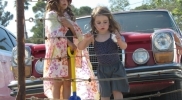



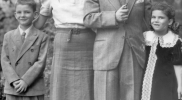
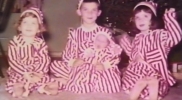
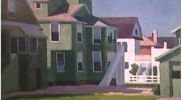
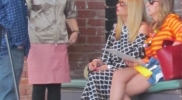
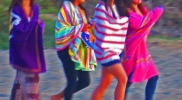
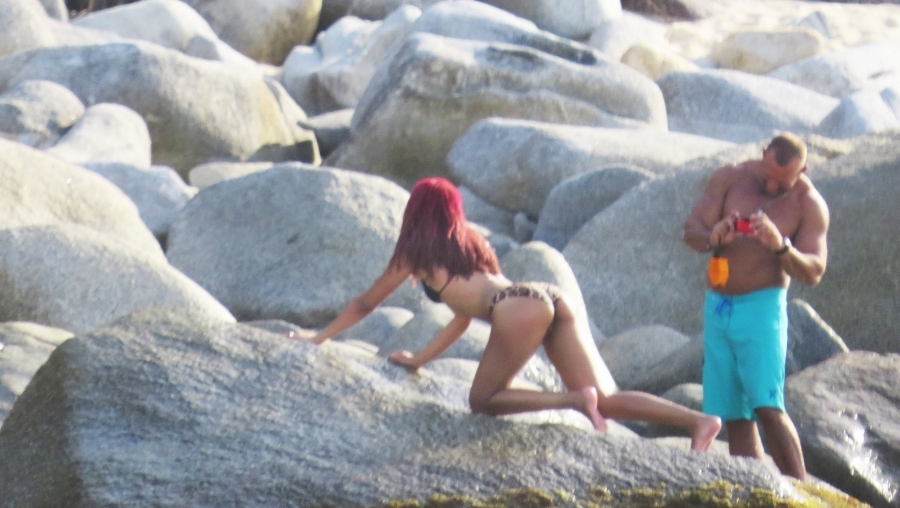
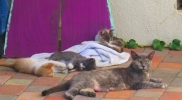
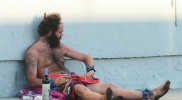
![[000015] [000015]](https://beforetheblog.com/wp-content/gallery/kids/thumbs/thumbs_000015.jpg)
